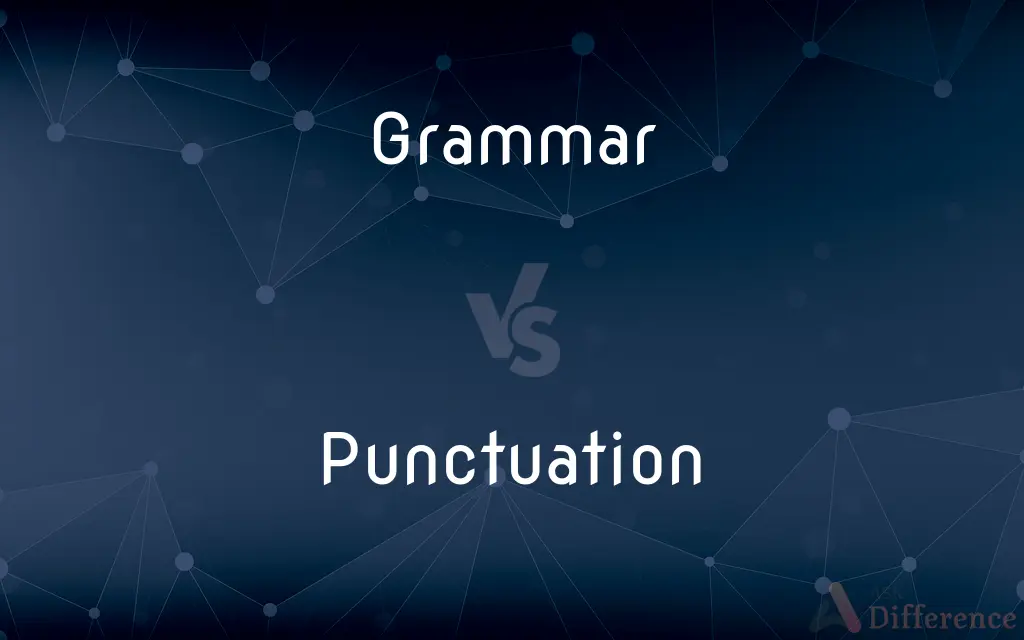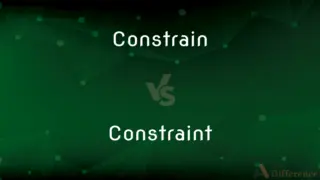Grammar vs. Punctuation — What's the Difference?
By Tayyaba Rehman — Updated on September 26, 2023
Grammar is the structured set of rules governing the composition of words, phrases, and clauses in a language, while punctuation encompasses the use of symbols to clarify and emphasize meaning in written language.

Difference Between Grammar and Punctuation
Table of Contents
ADVERTISEMENT
Key Differences
Grammar and Punctuation are fundamental elements of written language, with each serving a unique purpose in conveying meaning. Grammar is the comprehensive system of structured rules that governs the composition of words, phrases, and clauses in any language. It ensures that language usage is correct and logical, allowing for clear and effective communication. Punctuation, on the other hand, is a subset of grammar, dealing specifically with the symbols used in written language to denote pauses, ends of sentences, and the organization of clauses, contributing to the clarification and emphasis of meaning in texts.
Grammar operates on several levels, including morphology, syntax, and semantics, guiding the construction of meaningful sentences. It dictates the correct usage of words, the arrangement of words to form phrases and clauses, and the application of tenses and conjugations. Punctuation, in contrast, is concerned with the correct placement of symbols like commas, periods, and quotation marks, which aid in the interpretation of written texts, delineating sentences and their components to enhance readability and comprehension.
While Grammar is universal, applying to both spoken and written language, punctuation is exclusive to the realm of written communication. Grammar forms the backbone of any language, dictating the structure and functionality of its components, ensuring coherence and mutual intelligibility among its speakers. Punctuation, however, enriches written texts by providing visual cues that guide readers in understanding the structure and meaning of sentences, aiding in the discernment of the author’s intentions and the emotional tone of the text.
In learning and education, mastery of both grammar and punctuation is crucial. A solid understanding of grammatical rules enables individuals to construct meaningful, coherent sentences, facilitating effective communication. Proficiency in punctuation is equally important, as it ensures that written texts are clear, concise, and free of ambiguity, allowing readers to grasp the intended meaning without misinterpretation.
Comparison Chart
Definition
Set of structured rules governing the composition of words, phrases, and clauses in a language.
Use of symbols to clarify and emphasize meaning in written language.
ADVERTISEMENT
Scope
Operates on morphology, syntax, and semantics, applies to spoken and written language.
Exclusive to written language, a subset of grammar.
Function
Dictates the correct usage, arrangement of words, and application of tenses and conjugations.
Provides visual cues to enhance readability and comprehension of written texts.
Application
Enables construction of meaningful, coherent sentences in spoken and written communication.
Delineates sentences and their components, reflects the author’s intentions and emotional tone in texts.
Learning Importance
Mastery is crucial for effective communication and mutual intelligibility among speakers.
Proficiency is vital for creating clear, concise, and unambiguous written texts.
Compare with Definitions
Grammar
Grammar ensures that language usage is correct and logical, facilitating clear and effective communication.
Proper grammar is essential for conveying ideas accurately and persuasively.
Punctuation
Punctuation aids in the interpretation of written texts by delineating sentences and their components.
Proper punctuation ensures that the components of a sentence are clearly defined and easily understood.
Grammar
Grammar operates on several levels including morphology, syntax, and semantics to guide the construction of meaningful sentences.
Understanding the intricacies of grammar helps in the accurate arrangement of words and phrases.
Punctuation
Punctuation encompasses the use of symbols to clarify and emphasize meaning in written language.
Correct punctuation is crucial for conveying the intended meaning of a sentence.
Grammar
Grammar is the structured set of rules that governs the composition of words, phrases, and clauses in a language.
Her strong grasp of grammar allowed her to construct coherent and sophisticated sentences.
Punctuation
Punctuation is a subset of grammar, dealing specifically with symbols used in written language.
Understanding punctuation is vital for properly structuring sentences and avoiding misunderstandings.
Grammar
In linguistics, the grammar (from Ancient Greek γραμματική grammatikḗ) of a natural language is its set of structural constraints on speakers' or writers' composition of clauses, phrases, and words. The term can also refer to the study of such constraints, a field that includes domains such as phonology, morphology, and syntax, often complemented by phonetics, semantics, and pragmatics.
Punctuation
Punctuation provides visual cues that guide readers in understanding the structure and meaning of sentences.
Punctuation marks act as signposts, aiding readers in navigating through the text.
Grammar
The study of how words and their component parts combine to form sentences.
Punctuation
Punctuation reflects the author’s intentions and the emotional tone of the text in written communication.
The use of exclamation points in punctuation can convey excitement or urgency in a text.
Grammar
The study of structural relationships in language or in a language, sometimes including pronunciation, meaning, and linguistic history.
Punctuation
Punctuation (or sometimes interpunction) is the use of spacing, conventional signs (called punctuation marks), and certain typographical devices as aids to the understanding and correct reading of written text, whether read silently or aloud. Another description is, "It is the practice, action, or system of inserting points or other small marks into texts in order to aid interpretation; division of text into sentences, clauses, etc., by means of such marks."In written English, punctuation is vital to disambiguate the meaning of sentences.
Grammar
The system of inflections, syntax, and word formation of a language.
Punctuation
The use of standard marks and signs in writing and printing to separate words into sentences, clauses, and phrases in order to clarify meaning.
Grammar
The system of rules implicit in a language, viewed as a mechanism for generating all sentences possible in that language.
Punctuation
The marks so used.
Grammar
A normative or prescriptive set of rules setting forth the current standard of usage for pedagogical or reference purposes.
Punctuation
The act or an instance of punctuating.
Grammar
Writing or speech judged with regard to such a set of rules.
Punctuation
A set of symbols and marks which are used to clarify meaning in text by separating strings of words into clauses, phrases and sentences; examples include commas, hyphens, and stops (periods).
Different languages have different rules for punctuation.
Grammar
A book containing the morphologic, syntactic, and semantic rules for a specific language.
Punctuation
An act of punctuating.
Grammar
The basic principles of an area of knowledge
The grammar of music.
Punctuation
The act or art of punctuating or pointing a writing or discourse; the art or mode of dividing literary composition into sentences, and members of a sentence, by means of points, so as to elucidate the author's meaning.
Grammar
A book dealing with such principles.
Punctuation
Something that makes repeated and regular interruptions or divisions
Grammar
A system of rules and principles for speaking and writing a language.
Punctuation
The marks used to clarify meaning by indicating separation of words into sentences and clauses and phrases
Grammar
The study of the internal structure of words (morphology) and the use of words in the construction of phrases and sentences (syntax).
Punctuation
The use of certain marks to clarify meaning of written material by grouping words grammatically into sentences and clauses and phrases
Grammar
A book describing the rules of grammar of a language.
Grammar
(computing theory) A formal system specifying the syntax of a language.
Grammar
Actual or presumed prescriptive notions about the correct use of a language.
Grammar
(computing theory) A formal system defining a formal language
Grammar
The basic rules or principles of a field of knowledge or a particular skill.
Grammar
A book describing these rules or principles; a textbook.
A grammar of geography
Grammar
(UK) A grammar school.
Grammar
To discourse according to the rules of grammar; to use grammar.
Grammar
The science which treats of the principles of language; the study of forms of speech, and their relations to one another; the art concerned with the right use and application of the rules of a language, in speaking or writing.
Grammar
The art of speaking or writing with correctness or according to established usage; speech considered with regard to the rules of a grammar.
The original bad grammar and bad spelling.
Grammar
A treatise on the principles of language; a book containing the principles and rules for correctness in speaking or writing.
Grammar
Treatise on the elements or principles of any science; as, a grammar of geography.
When any town shall increase to the number of a hundredfamilies or householders, they shall set up a grammar school, the master thereof being able to instruct youth so far as they may be fitted for the University.
Grammar
To discourse according to the rules of grammar; to use grammar.
Grammar
Studies of the formation of basic linguistic units
Grammar
Grammar dictates the correct usage and arrangement of words, and the application of tenses and conjugations.
Studying grammar is crucial for mastering the complexities of verb conjugation and word order.
Grammar
Grammar is universal, applying to both spoken and written forms of language, forming the backbone of any language.
Knowledge of grammar is indispensable for learning new languages and comprehending the structure of one’s own.
Common Curiosities
Does punctuation encompass the use of symbols to clarify meaning in written language?
Absolutely, punctuation involves the use of symbols to clarify and emphasize meaning in written language.
Is grammar the set of rules governing the composition of words, phrases, and clauses in a language?
Yes, grammar is the structured set of rules that governs the composition of words, phrases, and clauses in any language.
Is mastery of grammar crucial for constructing coherent and meaningful sentences?
Indeed, mastering grammar is essential for constructing coherent, meaningful sentences and facilitating effective communication.
Share Your Discovery

Previous Comparison
City vs. Town
Next Comparison
Constrain vs. ConstraintAuthor Spotlight
Written by
Tayyaba RehmanTayyaba Rehman is a distinguished writer, currently serving as a primary contributor to askdifference.com. As a researcher in semantics and etymology, Tayyaba's passion for the complexity of languages and their distinctions has found a perfect home on the platform. Tayyaba delves into the intricacies of language, distinguishing between commonly confused words and phrases, thereby providing clarity for readers worldwide.















































